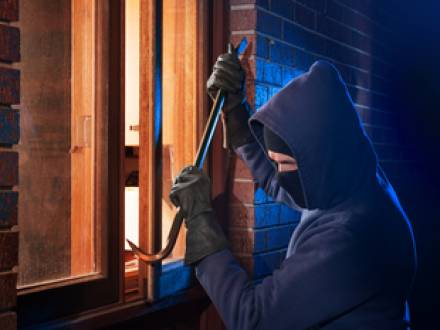What Are the Differences Between Burglary and Robbery?
 A former Glastonbury police officer was recently accused of being a "serial burglar" after breaking into businesses in four communities. The 37-year-old is suspected of at least 45 burglaries in Connecticut, Massachusetts, and Rhode Island.
A former Glastonbury police officer was recently accused of being a "serial burglar" after breaking into businesses in four communities. The 37-year-old is suspected of at least 45 burglaries in Connecticut, Massachusetts, and Rhode Island.
The man served as a Glastonbury police officer until September 2024 and is also a member of the Army National Guard who served time in Afghanistan. He was reportedly in good standing both as a police officer and of the National Guard, leaving fellow officers baffled as to the motive behind the alleged burglaries.
Although the terms "burglary" and "robbery" are often used interchangeably, they are very different crimes with different penalties. Both offenses are serious in terms of penalties and long-term consequences. Having an experienced Stamford, CT burglary attorney from Law Offices of Daniel P. Weiner can significantly affect the outcome of your charges.
Burglary vs. Robbery
Robbery occurs when a person who is in the course of committing theft or larceny threatens physical force on another person for the specific purpose of preventing resistance to the theft or compelling the owner of the property to aid in the commission of the theft. There are multiple degrees of robbery in Connecticut, and all of them are felony offenses.
A burglary occurs when a person unlawfully enters a building with the intent of committing a crime inside (usually larceny or robbery, but not always). Like robbery, burglary has varying degrees, all of which are felony offenses.
A person can only be convicted of robbery if the prosecution can prove that the defendant's actions satisfy the underlying legal requirements for larceny, specifically that the defendant intended to criminally deprive another person of his or her property. Robbery does not necessarily involve entering a structure, although burglary does.
Penalties for Burglary in Connecticut
The penalties for burglary will depend on whether it is charged as first-degree, second-degree, second-degree with a firearm, third-degree, or third-degree with a firearm. First-degree burglary is the most serious and is charged when the defendant is armed with explosives, a deadly weapon, or a dangerous instrument and inflicts bodily injury on another person while committing the offense.
First-degree burglary is a Class B felony (one to 40 years, $15,000 fine) with a five-year minimum mandatory sentence. Second-degree burglary is a Class C felony offense (one to ten years, $10,000 fine), while second-degree burglary with a firearm is a Class C felony offense with a one-year mandatory minimum sentence.
Third-degree burglary is a Class D felony offense (one to five years, $5,000 fine), while third-degree burglary with a firearm is a Class D felony offense with a one-year mandatory minimum sentence. Since a conviction for burglary requires proof of intent by the defendant to commit a felony or theft at the time of entry, lack of intent is one of the most common defenses used for the crime.
Penalties for Robbery in Connecticut
Robbery could be classified as a home invasion robbery (Class A felony), armed robbery, or unarmed robbery. Home invasion robbery has a mandatory minimum sentence of 10 years in prison and a potential sentence of up to 25 years. First-degree armed robbery with a deadly weapon has a maximum penalty of up to 20 years in prison, with a five-year mandatory minimum.
Second-degree burglary carries a maximum penalty of ten years in prison, with a one-year mandatory minimum when a firearm is present. Third-degree burglary carries a maximum penalty of five years in prison, with a one-year mandatory minimum when the defendant has a firearm.
Contact a Fairfield County, CT Burglary Lawyer
If you are facing robbery or burglary charges, having a Stamford, CT burglary attorney from Law Offices of Daniel P. Weiner as your legal advocate can significantly improve the outcome. Attorney Daniel Wiener has been helping clients charged with criminal offenses for more than four decades and has the experience necessary to make a difference in your charges. Call 203-348-5846 today to schedule a free consultation.







